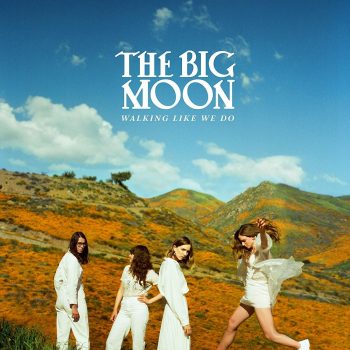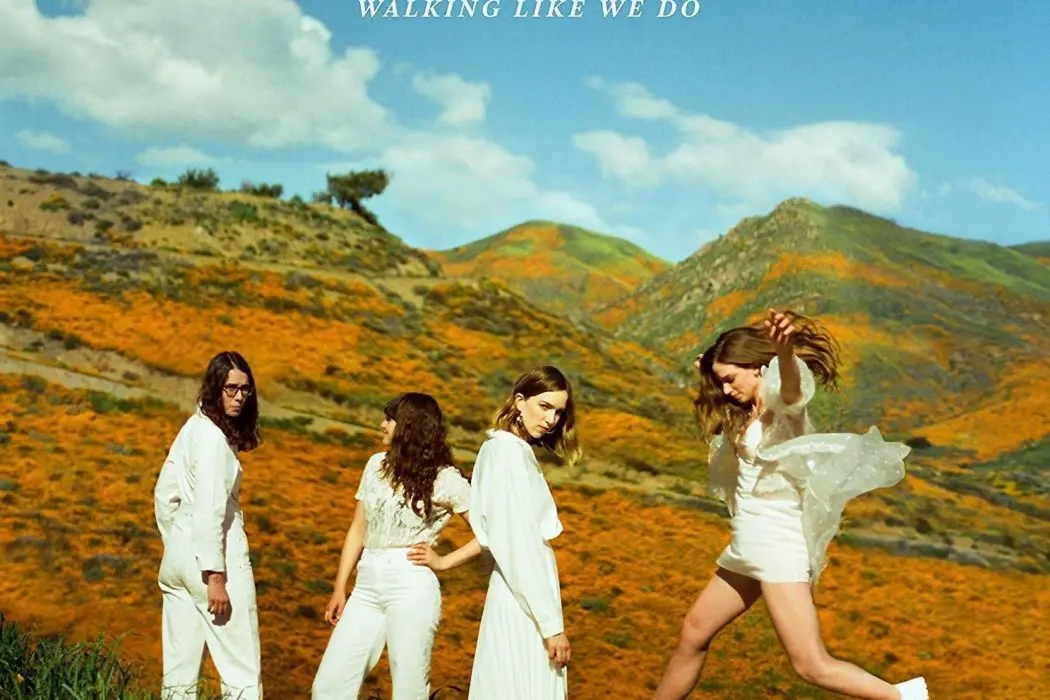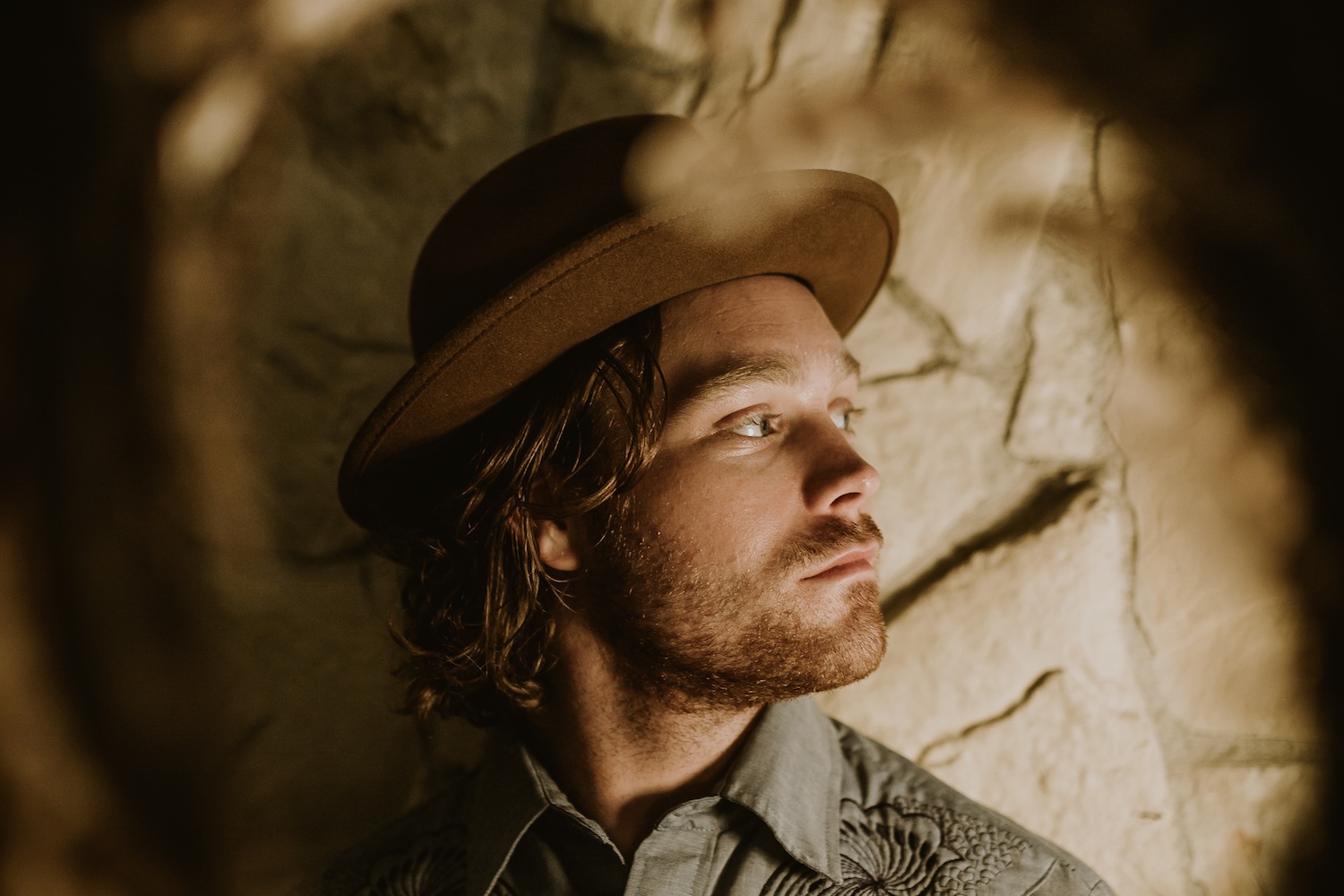‘Walking Like We Do’ as a phrase conjures a sense of regularity and routine, a casual stroll. The Big Moon supply nothing of the sort. The London four-piece’s second album is laced with fear, vulnerability, confusion, and loss. Yet, thanks to rich harmonies, vivid synths, and fantastic songwriting, you’ll come out the other end feeling dynamic and reassured.
•• •• •• ••
At first, “It’s Easy Then” does not sound like a typical opening track. The gentle, introductory fade-in and simple piano chords hint at something which came before. Frontwoman Juliette Jackson’s deliberately tired opening vocals add to a sense that this track is almost a chore, not an opener. However, the song shifts upon the arrival of a classic The Big Moon harmony, which unfurls unexpectedly upwards. Jackson outlines her emotional and mental fatigue and a desire to begin again, away from the jeopardy of symbolic silent movie props. “It’s Easy Then” builds, the distant ringing of a phone included in a melee of sound which, by the song’s end, suffocates the listener in a reflection of the lyric’s claustrophobia. The track stands alone at the beginning of the record, having outlined stresses and anxieties aplenty. Jackson pleas for vulnerability, but “It’s Easy Then” is, in fact, a bold and upfront opener.
The Big Moon’s second album, Walking Like We Do, begins braver than most.
Stream: ‘Walking Like We Do’ – The Big Moon

Through ‘Your Light,” Jackson, and band-mates Soph Nathan, Fern Ford, and Celia Archer get the fresh start they craved. The second track of Walking Like We Do is almost a second beginning to the record, powering along out of searching synths and an electronic choir. A relentless bass guitar is at the heart of the song, yet this powerful pulse belies delicately layered melodies across the multiple vocal parts.
Though both were released as separate singles prior to the album’s release, “It’s Easy Then” and “Your Light” are stronger in combination; the issues laid out in the former track are clearly a preoccupation which the latter takes up. “It’s Easy Then” effectively establishes the stifling conditions which “Your Light” seeks to alleviate. The Big Moon seemingly seek to distract from their own disconcerting gloom with the glare of the eponymous light, whilst simultaneously worrying that they will lose themselves amidst feelings of alienation and unfulfillment. Behind the disarmingly bright choral vowels, there are feelings of real concern, resulting in the yearning for diversion and connection which so connects with the listener.
The Big Moon’s soul-searching continues throughout Walking Like We Do:
We’re all just tryin’ to get the things we need
We’re all just tryin’ to get the things we need
There’s always someone out there screwin’ somebody
But we only see the things we want to see
Here, on “Dog Eat Dog,” the album is more plaintive. Amidst descriptions of pigeons and squirrels, The Big Moon paints an accessible and universal portrait of a new decade with the same problems. Jackson’s voice weaves in and out of the scene like an in-situ observer, dismissing trite idioms in favour of less palatable realities. We are reminded that the choices available to us do not have to be competitive and self-serving, as the song title nods towards. Jackson and The Big Moon are not, moreover, simply tour guides or unmoving bystanders. As listeners, we are urged to shun complacency and to reach out to those around us for reasons beyond selfish interest. As Jackson repeats “here we are,” the bridge culminates in symphonic sirens, an arguably ambiguous sound. Whether an alarm for the socio-economic and geophysical threats to our planet and its people, or a representation of a dawning chance for brighter, more positive actions, the tones wash over the end of the track, reiterating the gravity of the messages it contains.
Crucially, none of The Big Moon’s messages come across as sanctimonious. The care taken over the lyrics means they are more relatable than self-righteous. Moreover, the neatly intertwining vocal parts are instantly and infectiously catchy and are buoyed up by a healthy dose of synths. The Big Moon never wallows in self-pity, but instead cleverly treads an enthralling line between indie-pop sensibilities and post-punk realism.

After the existentialism of “Dog Eat Dog,” Walking Like We Do becomes somewhat more introspective. The quiet and confusing breakdown of a relationship during a trip to the beach is mourned by fretful piano parts on “Why” whilst the electric guitar cuts through the scene like a lightning bolt. The pop melancholia continues onto “Don’t Think,” a track which is underpinned by a steady drumbeat whilst the lyrics conjure swirling memories of abstract nights out. Jackson’s voice here is low and controlled on the verses then soars on the chorus, smartly furthering the themes of self-doubt and confidence to which the titular refrain refers.
Just don’t think about it now
Just don’t think about it now
Or your head will talk you out of it
Just don’t think about a thing
Just don’t think about a thing
And your heart will lead you into it
Again, it is the band’s ability to translate their experiences and anxieties into relevant lyrics and captivating musical arrangements which makes Walking Like We Do such an exciting album. Their gutsy electric guitar riffs and dazzling synth motifs are all the more effective for the contrast they provide with often fraught lyrics and multifaceted vocals.
This capacity for doing two things at once is demonstrated with thrilling results on ‘Waves” which begins with just the rueful reflections of Jackson and a slow, thoughtful piano accompaniment. It is a lonely ballad about missed signs and lost chances. Group harmonies soon slide into earshot, and “Waves” steps into an outro of “You had me going for a minute there,” growing stronger and bolder with each repeat. Despite the subject matter being laden with regret, it is hard as a listener not to join in on the climactic final bars, and to enjoy doing so. Walking Like We Do is accessible and grounded as well as emotional and layered. It is a bittersweet and then some.
“Holy Roller” and “Take A Piece” successfully dial up the swagger whilst still hinting at feelings of dissatisfaction. The former takes aim at modern alienation and notions of insignificance and includes Jackson threatening to take drastic measures to change those circumstances:
I’m gonna start a religion now
For all of the kids with no future
Paint our angels on the ceiling
We need something to believe in
Meanwhile, “Take A Piece” is also plagued by frustration; in this case, seemingly more romantic in tone. However, the lyrics here are relatively poised: “And I’ll never be enough ‘cause I’m human.” Like on “Holy Roller”, and much of the album, there are underlying doubts and anxieties, but these two tracks express such feelings in a comparatively more confident lyrical tone. Musically, this is mirrored stylishly on “Holy Roller” by an impish glockenspiel cameo and the confident jabs of the electric guitar. Jackson’s tongue-in-cheek religious aspirations, followed by her wry assertion on “Take A Piece” that her mortality deems her unworthy, exhibit a burgeoning, ironic self-reliance.
Both tracks portray an arguably more comfortable mindset than earlier tracks on Walking Like We Do. Perhaps as well as trying to change things for the better, a la “Dog Eat Dog,” The Big Moon also recognises the importance of finding the best in one’s lot. Furthermore, their sharp, modern lyrical details throughout not only nod to the recognisably contemporary nature of their angst, but also add a levity to the record. Indeed, The Big Moon’s sense of humour has been on display before, most recently in their music video for “Take A Piece” which joyously went to town on a chorus steeped in ’90s pop.
Watch: “Take A Piece” – The Big Moon
As well as looking back aesthetically, The Big Moon looks forward just as engagingly. “Barcelona,” one of Walking Like We Do’s strongest tracks, is all about the self-assessments that come with maturity and growth; friends are moving away, having kids, or finding financial security, whilst Jackson takes stead. It is surely no coincidence that ‘Barcelona” begins with a call-and-response flute introduction, heavily reminiscent of Grieg’s iconic “Morning Mood” melody. Jackson reassures herself that she is “ok” in spite of missing a now absent loved one, and the flute motif returns underneath, suggesting that she is turning a corner after a period of darkness.
It is not all sunrises and new beginnings, however. Though harmonies glisten atop Jackson’s vocals, adding an optimistic layer above the main melody, the opening lyrics suggest the need for Dutch courage amidst transitioning circumstances. Jackson admits candidly “I may be present, but I’m not all here.”
The chorus then arises almost unexpectedly, suddenly awash with rich, echoing vocals one minute, then quiet reflection the next. Despite directing the lyrics at the unseen object of longing, Jackson in fact seems more intent on convincing herself of her solidity, perhaps signaling a need to re-find certain parts of her past self, those which are “not all here.” By the song’s end, the journey is not wholly complete, but Jackson, Nathan, Ford, and Archer seem to recognise themselves amongst the natural changes and cycles of adulthood. The blurred lines between the “other” and the “self” return in the closing bars:
We’re all moving on
And you’re better off now
Yet the need for a new-found fortitude still remains in part:
I’m at the party wondering if it’s alright
Will I toast her future and drink heavy for mine?
Fraught lyrically yet refreshing and lush musically, “Barcelona” is perhaps the track that could best represent Walking Like We Do on its own. The vulnerability and tenderness make the song immediately intimate and arresting. Vocally, it is The Big Moon at its best, each member complimenting the others’ melodies as the emotion of the song twists and turns. The verses are equal parts honesty and humour, and the chorus is a smart sucker-punch.
“A Hundred Ways To Land” immediately answers the question that the final line of “Barcelona” asks. The confidence which has been building throughout the entirety of Walking Like We Do is unleashed defiantly in this penultimate track; a strident piano and bass drum pairing thumps the listener in the gut with unmistakable power.
On top of this robust introduction, the temporal nature of The Big Moon’s concerns is addressed to great effect. Whether in regard to the contemporaneity of the problems The Big Moon encounters or the sea-changes occurring around the band members’ lives, time has been at the root of many of Walking Like We Do’s lyrics. “A Hundred Ways To Land” is no different. Jackson immediately highlights that “the times are strange,” but also utilises seasonal motifs within the lyrics. This serves as a perfect inventory from which to draw lessons of growth, change, and time – as well as a fantastic pun on the double meaning of “fall.”
Listen: “Barcelona” – The Big Moon
“A Hundred Ways To Land” draws heavily on images of unseasonal cold, hibernation, and regeneration. This does not simply build on the previous examples of time’s influence across the album but assigns a naturality to them. The Big Moon recognises that change is unavoidable and so challenges it head-on. Moreover, it is not the specific obstacles which matter, but one’s response to them – the eponymous “Ways To Land.” The Big Moon’s response is an incisive and anthemic song.
Jackson’s voice again ebbs and flows but is unflinching throughout. She is reinforced as ever by her band-mates, which further buttresses their message:
I don’t care if it’s snowing even though it’s almost June,
So feel your blood flowing, stand up taller in your boots
Having rallied her troops, Jackson sets about marching; a rousing fanfare sets the tone for the titular refrain of “Walking like we do.” It is, of course, apt the album takes its name from this lyric, due to the seismic emotional progress the song represents.
Jackson claims “We don’t know where we’re going,” but it’s hard to believe her.

Closing track “ADHD” is self-diagnosis in song, at the end of an album rife with self-assessment and reassurance. There is, though, certainty amongst the questioning:
Is it you or is it me?
I don’t have to think
I know
What begins as a pleasantly subdued epilogue gradually fizzles and simmers, soon incorporating an entertaining mix of electric guitars, organs, and brass parts. The outro, a chorus of harmonised “ooh’s,” is relaxed and carefree. There remains vulnerability in the lyrics, but it is a vulnerability which The Big Moon has come to own over the course of 11 songs. There is confidence amidst the chaos, maturity amongst the melee.
Walking Like We Do is an uplifting antidote to the disorder reflected in its lyrics. The Big Moon are not a band in denial, nor one that claim to have all the answers, yet their sophomore album is ever-relatable, compassionate, and sincere. As a listener, you can chart the emotional growth and maturity throughout the record, as confidence grows amongst the candor. The harmonies make you swoon, and the synths, guitars, and drums keep you tuned in to the tone and emotion of each track and the journey at the crux of the album.
Crucially, Walking Like We Do is a more vibrant and refreshing album than it has any right to be. In the eye of very personal storms, The Big Moon calms, warms, and reassures, and has fun whilst doing so.
— —
:: stream/purchase Waking Like We Do here ::
— — — —

Connect to The Big Moon on
Facebook, Twitter, Instagram
Discover new music on Atwood Magazine
? © The Big Moon 2020
Walking Like We Do
an album by The Big Moon









